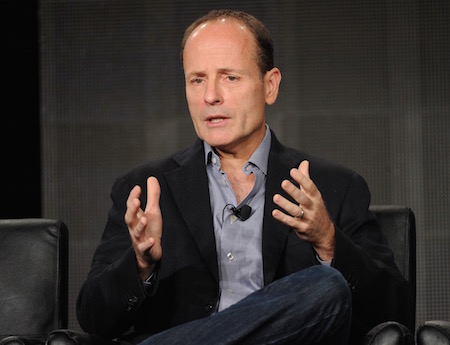TCA: FX's Landgraf Believes 'Peak TV' Has Arrived

The smarter way to stay on top of broadcasting and cable industry. Sign up below
You are now subscribed
Your newsletter sign-up was successful
Beverly Hills, Calif. — FX Networks head John Landgraf attacked the overall glut of programming during his TCA executive session Friday, saying 2015-16 will represent "peak TV," with a decline in originals to follow.
The boom in original cable, broadcast and streaming shows, from about 280 five years ago to more than 400 at year-end, by FX's calculations, can be measured by the "blood pouring out of your eyeballs," he quipped. The inevitable result, he said, is ratings erosion for all but an elite handful of shows such as Game of Thrones, The Walking Dead and Empire.
That opening thrust led into a 45-minute deep dive into a range of issues that networks, content creators and audiences are grappling with: not just the programming bubble, but multiplatform, on-demand, advertising and the rise of SVOD services. While he devoted a few minutes to success stories like American Horror Story, The Americans and The Strain, as well as missteps like The Comedians (which he argued got significantly better as Season 1 progressed, but kept losing audience), Landgraf used the bulk of his stage time to talk big picture. It was a welcome change during TCA from the execs who kept their appearances strictly superficial and promotional.
Landgraf repeatedly underlined the importance of network brands as filters for overwhelmed viewers. That will be the key to their ultimate survival, he argued.
"Ten years from now, the linear channels that make up FX Networks will exist. But consumption of our content off linear platforms may represent 50% of overall consumption, as opposed to 95% today," he said. Rebalancing the business in the interim is "going to be a messy, inelegant process." At the same time, he said, "Wall Street's reaction [to indications of cord-cutting's threat in recent earnings reports] is way over the top. There's nothing that Bob Iger said on his call that I didn't see coming and haven't been planning for for many years. It is a transition. It's a bumpy, rocky transition but it's not a bumpy transition that yields a valueless future for major media companies."
Related: All This TV: Too Much of a Good Thing?
Already during the two-decade run of FX, there have been dramatic changes. "When I started, 55% of our revenue was from advertising," Landgraf said. "This year it's about 32% and we're projecting it to decline in the next two years to 30%. But about 12% is content ownership and that didn't used to exist at all."
The smarter way to stay on top of broadcasting and cable industry. Sign up below
One pressure point is owning content in post-linear windows.
"I would prefer not to have sold any of our content to Netflix," he said, "But when you're in a business that can successfully monetize somebody's content and you have another business that can't, it's difficult to refuse that money." The gap between what SVOD services are able to pay and how much content owners can reap by distributing it themselves (via ad revenue in VOD or other means) simply has to narrow, Landgraf insisted.
Traditional players do have baggage, he conceded. But the bundle in some form is an economic and consumer-behavior imperative. "A channel is an artifact of a linear ecosystem," he said. "What we have to figure out is a new bundle of programming because I don't believe there's any future where programming is produced and distributed on an a la carte basis. You have to have a portfolio of programming in order for people to invest and to market and in order to take risks."
Asked about the parade of actors and showrunners who have gushed throughout TCA about the bliss of working on a streaming show, Landgraf said, "Frankly, when you pay people, they tend to want to get up onstage and say nice things." He also recounted his experience of signing Louis C.K. to do the first season of his show. By initial arrangement, neither Landgraf nor anyone on his team gave notes or interfered with the making of the show after $4 million had been wired to the comedian to start production. Over time, absent any communication at all with FX brass, C.K. came to see the merit of discussing episodes with the network. "He ended up wanting my input and wanting to know what worked and didn't work." Eventually, the two would have a lengthy conversation every time an episode edit would arrive.
In terms of that rapport with creatives, he added, "With all due respect to Netflix, Amazon and Hulu, their models are patterned after our model."
